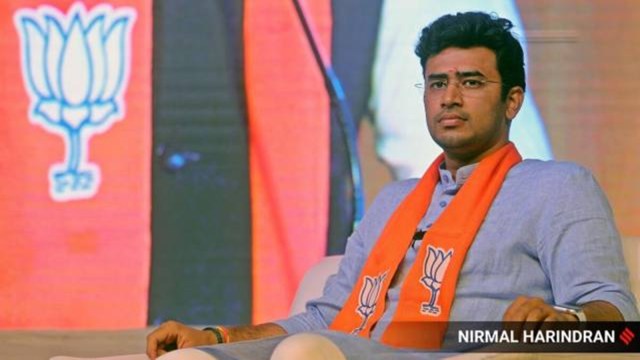Bengaluru MP Tejasvi Surya calls for BMRCL audit, cites ‘project delays and cost overruns’
In his letter, Surya also mentioned that the delays in metro projects, such as the Yellow and Pink lines, have caused significant inconvenience to the public and affected productivity.
 Surya’s letter points to a series of 'administrative failures' within BMRCL, including significant delays in completing key metro lines. (Express Archives)
Surya’s letter points to a series of 'administrative failures' within BMRCL, including significant delays in completing key metro lines. (Express Archives) Bengaluru South MP Tejasvi Surya has asked the Public Accounts Committee (PAC) to conduct a comprehensive performance audit of the Bangalore Metro Rail Corporation Limited (BMRCL).
In a formal letter addressed to KC Venugopal, Chairperson of the PAC, dated October 11, 2024, Surya outlined critical concerns regarding the BMRCL’s ongoing projects, highlighting persistent delays, cost overruns, and inefficiencies.
Surya has pointed out glaring operational and administrative issues, especially in the implementation of Phase 2A, 2B, and 3 of the metro expansion, encompassing critical areas such as Silk Board, KR Puram, and Hebbal, which aim to extend the network by 100 kilometers from the current 73 km.
The letter comes amidst BMRCL’s delayed process in procuring rolling stock to cater to the growing metro passengers, delay in commissioning the 3.7km stretch between Madavara and Nagasandra metro stations, and delay in operationalising the Yellow Line (18.8km) between Bommasandra and RV Road.
Recently, Surya also requested Union Minister for Housing and Urban Affairs, Manohar Lal Khattar to grant permission to operationalise the 3.7km stretch which is delayed even after Commissioner of Metro Railway Safety’s green signal.
Surya’s letter points to a series of ‘administrative failures’ within BMRCL, including significant delays in completing key metro lines. For instance, while civil works on the Yellow Lineare reportedly 90% complete, the project has been stalled due to the delayed delivery of the 216 coaches from its rolling stock from the manufacturer. “Similarly, manufacturing for the Pink Line’s train sets only commenced in August 2024, pushing the projected operational timeline to late 2026, despite previous targets indicating an earlier start. Even the operation on the existing lines began only after multiple delays, pointing to systemic inefficiencies within the organization,” Surya said.
In his letter, Surya also mentioned that the delays in metro projects, such as the Yellow and Pink lines, have caused significant inconvenience to the public and affected productivity.
His request to the PAC centers on the need for an in-depth examination of BMRCL’s financial discipline, operational management, and adherence to project timelines. He proposes that the audit should focus on key areas such as cost overruns due to project delays and the financial implications on public funds; traffic congestion and the associated loss of productivity, driven by delayed metro projects; environmental impact, particularly the increased vehicular emissions exacerbating air pollution in the city; effectiveness of measures taken to address these delays and whether BMRCL has achieved its desired objectives and status of achieving the 317 km metro coverage target outlined in the Comprehensive Mobility Plan 2031, along with an assessment of current strategies in place to meet this goal.
His letter also highlights that despite consistent advocacy for addressing the administrative shortcomings of BMRCL, previous pleas have not resulted in adequate corrective actions. “The performance audit is a critical step toward ensuring transparency and accountability in one of Bengaluru’s most important public transport projects,” said Surya.
With 73.81 km already operational, Namma Metro is the second-longest metro network in India, serving over eight lakh passengers daily on average. An additional 101.74 km of metro lines are currently under construction, including a 3.14-km extension of the Green Line, the 19.15-km Yellow Line, the 21.26-km Pink Line and the 58.19-km Blue Line. With the recent approval of Orange Line (44.5km) by the Centre, the metro network will expand to 222.2 km.







